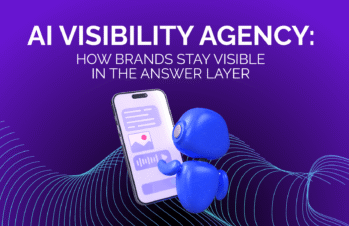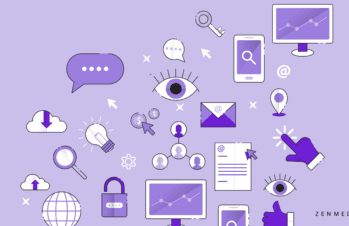For B2B companies today, getting and keeping business is more complicated than ever. Lots of factors at play, including a steady stream of new companies entering markets, mergers and acquisitions that shift the competitive landscape, and buy-cycle teams that can be as big as 10 people–all critical relationships in nurturing a sale.
It’s an issue worth writing a blog about!
In today’s crowded, noisy market environment, a great customer relationship management (CRM) system can help lessen the complexities of getting, keeping, and growing important relationships – the lifeblood of any growing company. In other words, expertly managing relationships with decision makers, influencers, thought leaders, end users, and other stakeholders is currency worth protecting.
At Zen Media, we know firsthand just how essential it is for businesses to implement CRM strategies to manage every aspect of their business, both internally and externally.
This guide will explain CRM systems and review the marketing tools and strategies B2Bs can implement to successfully meet their business goals.
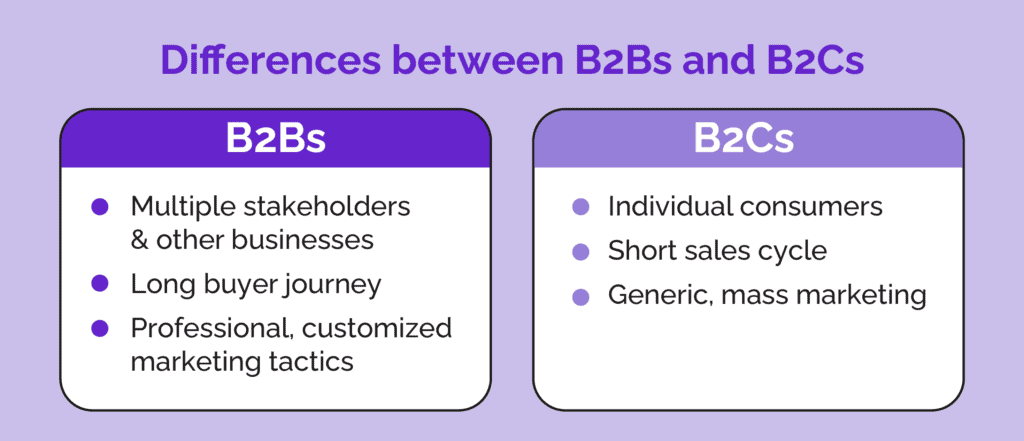
Differences Between B2B and B2C CRM Strategies
Before we begin, it’s important to draw distinctions between B2C and B2B CRM Strategies. While both B2Cs and B2Bs have to use CRM to maintain customer loyalty and attract potential customers, the customers themselves differ.
As mentioned above, B2Bs work with other businesses and multiple stakeholders who make up those organizations, while B2C companies focus on individual consumers. Businesses will have to adjust their marketing efforts and CRM strategies as a result, with B2Cs typically taking a more informal, personable approach. But don’t worry, B2Bs—we won’t let B2Cs have all the fun. Just remember to maintain professionalism when adding in some lighthearted humor and personal touches to your customer interactions.
Maintaining good CRM is critical to B2B because the buying process is much longer and more involved compared to B2C transactions. This means B2B CRM strategies need to focus on nurturing relationships over an extended period of time, rather than relying on a short sales cycle more common to B2Cs.
Think about it this way: if you have to purchase laptops for your organization, you’ll need to consider the needs of every department, budgets, company goals, and more. Your graphics teams and IT personnel might require robust hardware with faster processors and the ability to run multiple programs at once, while your accounting department might prioritize software to keep it running. This requires oversight and approval from different people at various stages of the buyer journey before finally making your purchase. If you’re buying a laptop for personal use, you simply have to consider your own needs and budget.
Another difference is the level of personalization required in B2B CRM strategies. In B2C interactions, businesses often rely on mass marketing tactics to connect with a wide audience. However, in the B2B space, you must truly understand your customers’ needs and preferences, as well as their industry, challenges, and business objectives. This means tailoring your B2B CRM strategies to meet the individual needs of your customers in order to build trust and long-lasting relationships.
Related read: What Motivates Buyers: Practical Strategies to Reach B2B and B2C Consumers
Key Components of B2B CRM
Now that we know the value in implementing a CRM system for B2Bs, we can discuss the key components, which include contact management, sales management, marketing automation tools, and customer service and support to drive faster sales conversions.
Contact management: CRM systems help companies organize and manage their business contacts. Not only do they include contact details, they can also keep a record of communication, note special requests or preferences, and set reminders to periodically reach out to customers. Sales management: Because buyers spend more time researching, the B2B sales funnel requires several touch points before conversion. CRM helps sales management by tracking sales pipelines, forecasts, and performance. Your team can use a CRM system to manage leads, streamline sales processes, identify opportunities for upselling, and improve overall efficiency in customer conversion.
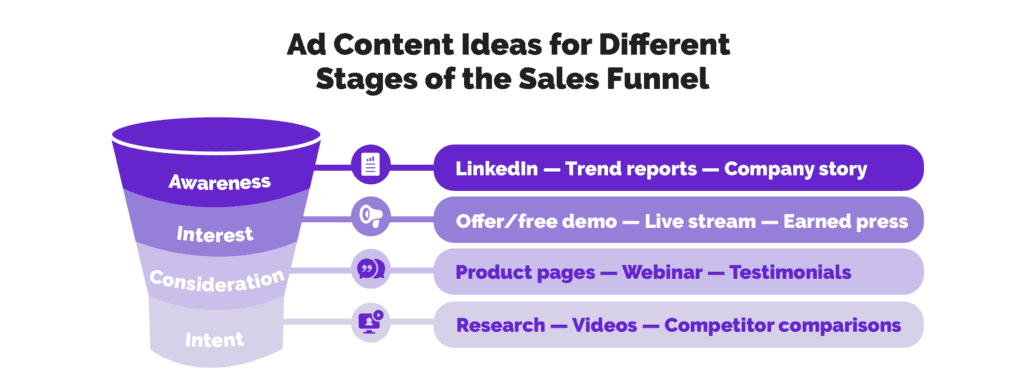
Marketing automation: Posting on social media, sending email blasts, personalized onboarding, behavioral targeting, lead nurturing, and targeted advertising are all examples of marketing automation. Lean on this technology to free up your administrative time so you can focus on customizing content for your target audience.
Customer service and support: Managing customer inquiries and issues is just one element of providing excellent customer service. Maintain strong relationships with your clients by tracking issues to resolve resolutions in a timely manner and checking in with customers to make sure all issues have been resolved.
Be accessible across various channels to make it easier for customers to reach you, and implement chatbots to handle small tasks or direct customers to the appropriate departments. Finally, provide educational and helpful resources for your customers across your website and social media channels.
Benefits of Implementing a CRM System in B2B Organizations

There are several excellent CRM platforms on the market. Once you make your selection, take time to train your team and familiarize yourself with the platform. This is the most challenging part of implementing a CRM system, but stick with it! This period of adjustment is natural and your team will be running more efficiently before you know it.
Once your team is comfortable with the CRM system, explore ways to enhance your experiences with it to reach your business goals. Implementing a CRM system will yield enhanced customer insights and data analysis, improved sales efficiency and productivity, personalized marketing and customer experience, and increased customer retention and loyalty.
Enhance customer insights and data analysis: CRMs are equipped with the latest technology. Leverage these capabilities to assess areas for improvement. How often are your customers making purchases? What are common pain points? Can you easily identify solutions? By tracking and analyzing customer interactions, businesses can better understand their needs and preferences, allowing for more targeted marketing efforts and personalized customer experiences.
Improve sales efficiency and productivity: Have you followed up with your leads? Is your sales team making the best use of their time? Do you have a strong sales process in place? Are you making the most of your marketing and sales opportunities? Data from CRMs empower B2Bs to improve sales efficiency and productivity. Automation can be used to schedule reminders or follow up with potential customers, while real-time data can indicate when it’s time to reach out to customers with updates or new purchases.
By automating key sales processes and providing sales teams with real-time data and analytics, B2B organizations can streamline their sales pipelines, prioritize leads, and increase ROI.
Personalize the marketing and customer experience: Even when customers experience similar pain points, their needs will still be different. B2Bs can address specific issues and create personalized solutions in marketing and customer experience with CRMs. Armed with data, your sales, customer experience, and marketing teams will be better prepared to tailor interactions, make recommendations based on previous purchases, segment customers, target specific audiences with relevant messages across different channels, collect feedback, track the effectiveness of marketing campaigns, and deliver meaningful content and support.
Increase customer retention and loyalty: When you leverage the technology above, your CRM will empower you with the resources you need to meet customers where they are. CRMs do more than extract valuable insights; they provide you with the tools to attract new customers and strengthen existing relationships.
Challenges in B2B Customer Relationship Management
Have you ever had to transition your employees from one program or platform to another? If so, were you met with resistance? You’re not alone.
As much as technology helps businesses overcome various obstacles, it also creates new challenges. Regardless of company size, integrating a CRM with your existing systems and data silos may prove challenging. Look for solutions that provide extensive help during the transition process and confirm they will work with your existing systems to avoid headaches down the road.
Even if you don’t experience issues with your tech stack, adopting a new CRM can be met with resistance, especially since digital transformation is causing change fatigue in employees. Avoid these issues with a slow, detailed migration process and encourage employees to get involved. Ensure your organization is open to communication and provide access to support. Finally, remember that not everyone moves at the same pace. A little patience goes a long way in overcoming issues related to CRM training and adoption.
Another challenge you should look out for? Data privacy and security. Whether you’re working with individual consumers or businesses, collecting personal data is necessary for business. Downloading apps, signing up for services, and making purchases online require customers to share personal information that is used for a variety of purposes. But no matter how accustomed we are to trading data for access, 46% of people are concerned about companies tracking their online data.
With so many headlines about data leaks, hacks, and breaches, it’s no wonder people are concerned about their online security. Help your customers understand why you collect data and how it’s used to tailor outreach and enhance the customer experience. And check out your CRM platform’s security practices to ensure your customer data remains safe and protected.
Selecting the Right CRM Software for B2B Companies
From Salesforce, to Hubspot, to ClickUp, to Asana, there’s no shortage of CRM platforms to help you manage customer data, assignments, and communication. Customization, third-party integration, and automation are just a few of the features you should consider in your B2B CRM solution. Explore our recommendations below.
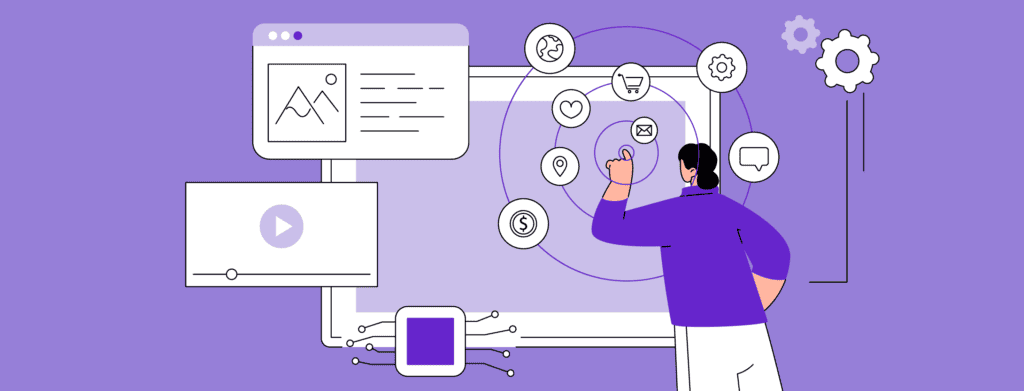
Key features to look for in a B2B CRM solution.
Customizable software: Your customers are unique, and the CRM software you choose should reflect that. Look for customizable options to personalize experiences and information for each customer. Employees can also benefit from customizable options to create workspaces that increase productivity.
Third-party integration: The ability to seamlessly integrate your existing tools and platforms with a CRM solution is critical to minimizing disruption and enhancing your workflow. Choose a CRM that can work well with multiple apps to cover a variety of business needs. This also makes it easier to collaborate across platforms both internally and with your customers or vendors when necessary.
Communication and collaboration: Keeping track of your customer requests and internal assignments can be challenging when juggling multiple clients or projects. Find software that centralizes client communications by allowing you to integrate existing third-party apps (such as emails or calendars)
Accessibility: The wide-scale adoption of remote and hybrid work models has increased accessibility for teams across offices, states, and countries. Look for cloud-based software that enables remote access for your teams from anywhere.
Automation and scalability: Whether you’re scheduling messages, creating recurring reminders, or tracking time, artificial intelligence (AI) is already likely playing a huge part in enhancing your CRM workflow. IDC predicts global spending on AI solutions will exceed $500 billion in 2027.
B2Bs using CRM systems should embrace this emerging technology now to get ahead of the curve. Start with automation and allow AI to handle repetitive tasks and reminders, create and share templates or content, track and nurture customer data to increase lead management, and enhance employee productivity.
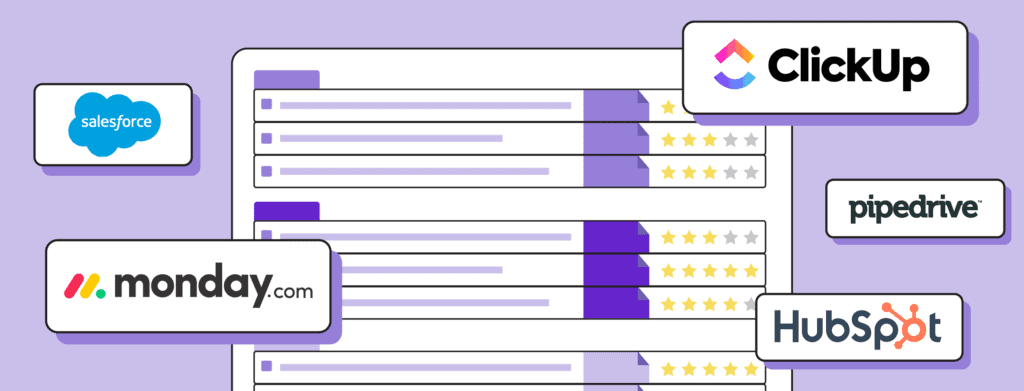
Comparison of popular CRM platforms for B2B businesses.
If we listed each popular CRM platform, we’d be here all day. Instead, we’ll share our thoughts on a few of our favorite options.
Monday.com
This operating system enhances workflow and can be used as a CRM. Customization, automation, seamless third-party integrations, and centralized communications are platform highlights that allow businesses to manage clients or accounts.
Simply create a sales pipeline to track leads, emails, contract start and end dates, and contact information. You can also assign account managers, sort clients by priority, industry, or status, and track numerical data to determine close probabilities and forecast values.
Pipedrive
A sales CRM and pipeline management software, Pipedrive provides a visual representation of the sales process. With Pipedrive, businesses can magnate leads and deals, track communications, automate and grow, review customized metrics, and keep data private and secure.
ClickUp
This productivity tool secured a top-three spot in G2’s list of the highest rated CRM software with 50% of respondents working in marketing and advertising. ClickUp has a CRM template for users that allows businesses to visualize their pipelines, collaborate with teams, collect and analyze data to track and manage accounts, and streamline customer workflows with automation. Big-name clients include IBM, Spotify, Netflix, and Logitech.
HubSpot
A platform of software, tools, and resources for business, HubSpot’s CRM software has freer tools to track and analyze sales activity in real time, build email templates, schedule meetings, and do more with AI.
HubSpot also has a platform dedicated to enterprise businesses that includes software for sales, customer service, content management, operations, and commerce.
Salesforce Sales Cloud
This cloud-based CRM solution provides sales details and leads at a glance. Customization and automation increases productivity to close deals quickly and with greater efficiency. Customers who use this CRM even reported a 28% increase in sales revenue.
Tips for successful CRM implementation and adoption.
You’ve selected a CRM platform—congrats! The next step is implementation. Start by contacting your platform’s customer service and setting up demonstrations or tutorials for your employees. Most will provide you with a representative to answer all your questions and share valuable information.
Encourage your team to set aside time each day to watch video tutorials and experiment with the platform. You can speed up the integration process by assigning a team member from each department or creating a special committee dedicated to handling the integration and becoming platform experts. And start small. Trial integrations by departments, projects, or clients before expanding to the rest of the company.
Just remember, finding your way around a new platform will take some time. Set goals, but give yourself and your team members time to navigate the platform.
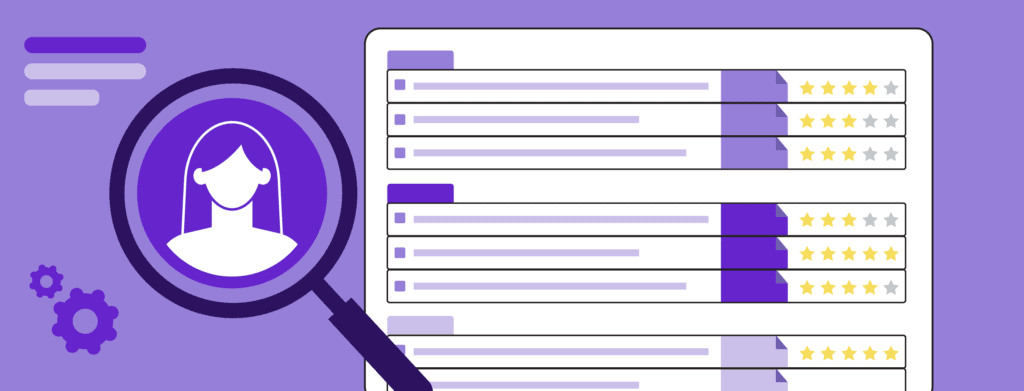
Best Practices in B2B CRM
Selecting your CRM system is just one piece of the giant B2B puzzle. In order to implement a successful CRM strategy, B2Bs must understand how to make the platforms work for them. Check out our advice to make the most of your CRM below:
Manage data and provide quality assurance. Are your customer contact details current? Does your current CRM platform have performance issues? Ensure important information is organized and up to date, and keep your tech stack running smoothly to avoid data loss, errors, and upset customers.
Segment B2B customers for targeted marketing. What’s one simple way to improve target marketing? Segmenting your customers. Group customers according to their needs, preferences, and buying behaviors to customize content and deliver it to the right customers at the right time. This approach leads to higher customer engagement and conversions.
Develop a customer-centric culture within the organization. Retaining and acquiring customers doesn’t happen without positive customer experiences. Ensure all of your employees, not just those in customer-facing roles, know who your customers are, what drives them, and how to build strong relationships with them. By prioritizing customer satisfaction and loyalty, B2B companies can differentiate themselves from competitors and create a positive reputation in the industry.
Leverage AI and machine learning for enhanced CRM capabilities. AI and machine learning have been critical components driving efficient workflows for years, but features have really ramped up recently. Spend time with your platform’s AI-powered tools to make data-driven decisions, create templates, draft emails, set reminders, and organize tasks. Lean on their capabilities to quickly analyze customer data to reveal patterns, behaviors, and preferences.
The Future of B2B Customer Relationship Management
The speed of technological innovation for CRMs isn’t slowing down any time soon. Customers and businesses alike can anticipate increased, rapid adoption of emerging technologies in AI, machine learning, and IoT. But it’s not just the tech that will undergo change; CRM strategies will become increasingly customizable and flexible to meet employee and customer needs.
Embrace AI-powered CRMs
Microsoft predicts AI-powered systems will continue their upward trajectory, leading the way for CRMs to expand data-driven strategies and tactics, prioritize personalized experiences for users, and create greater efficiencies using AI and cloud technologies. But with great technological power comes great responsibility. Expect increased scrutiny of AI ethics across industries as these powerful tools continue to evolve.
Because of its role in shaping CRM strategies, Microsoft believes changes to AI will also lead to more AI-focused jobs and changes to CRM platforms down the line, citing the development of low-code/no-code tools as an area to watch.
Interactive elements, experiential rewards, and exclusive content will also play a major role in the next wave of CRM updates.
CRM and IoT
The Internet of Things (IoT) connects users to a vast network of devices. A few examples of IoT in B2B include smart grids, security sensors, environmental monitoring, and supply chain management. With smart homes and appliances, wearable devices, and medical devices, the B2C space has made IoT a central part of our daily lives and we can expect that trend to translate to B2B.
Major companies like Salesforce have already touted the benefits of IoT integrations in CRM platforms, focusing on access to real-time data from anywhere, at any time as a key component driving the technology forward to help B2Bs and customers make better informed decisions.
Maximizing the Value of CRM in B2B Relationships
B2Bs looking to successfully navigate the complexities of modern customer relationships must adopt or expand their usage of CRM systems to personalize and enhance customer experiences, drive conversions, and remain competitive.
As AI continues to shape the B2B landscape, organizations can expect continued usage of AI and machine learning capabilities to make data-driven decisions, provide valuable insights into customer behavior and preferences, and improve the overall customer experience.


